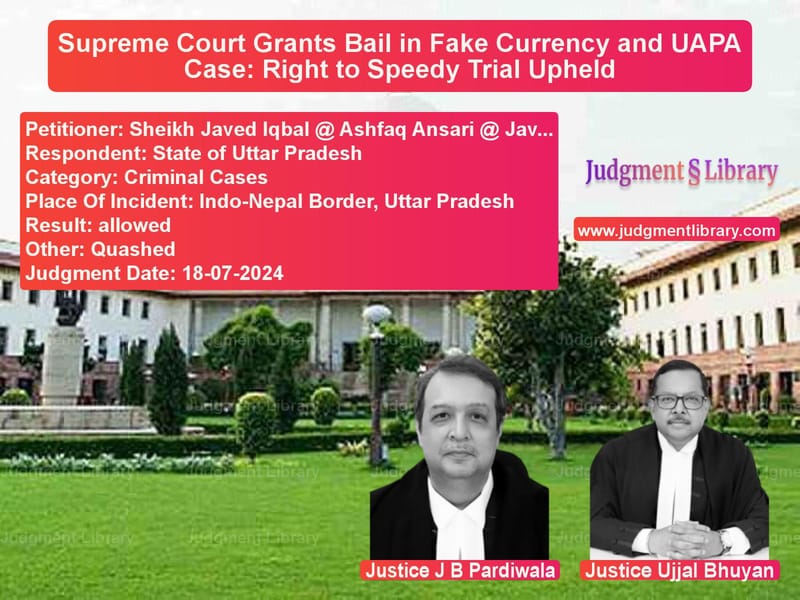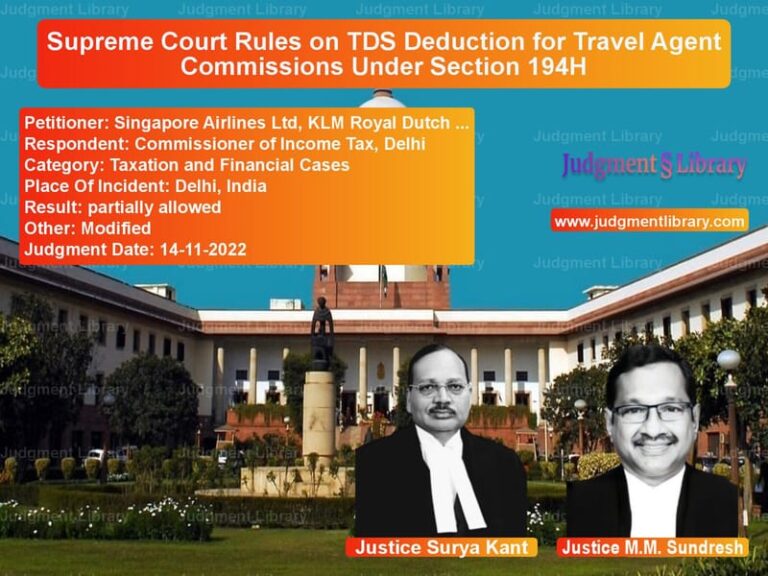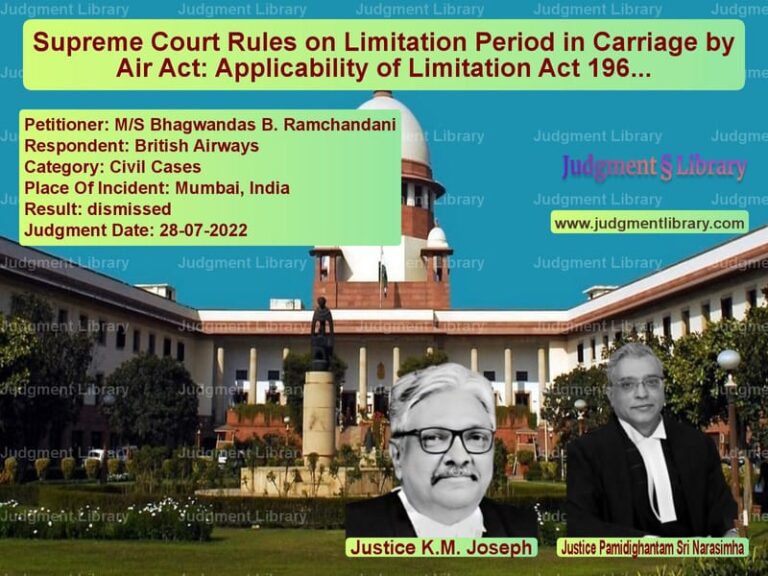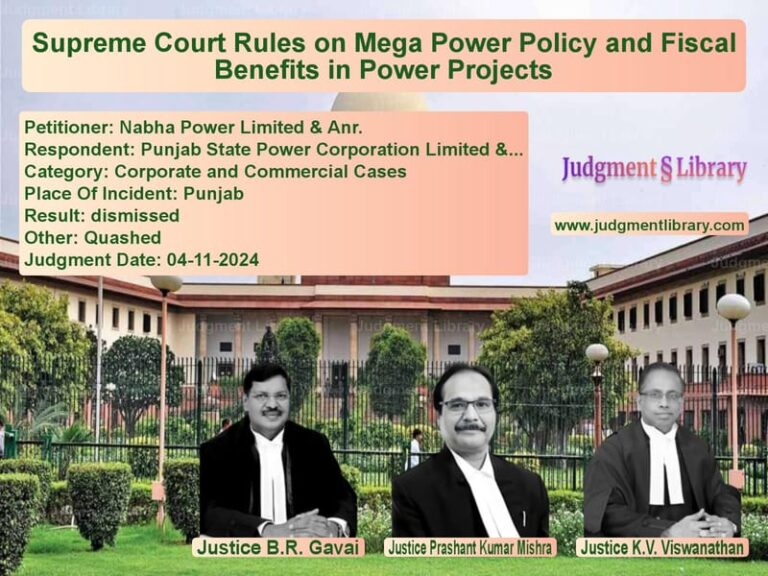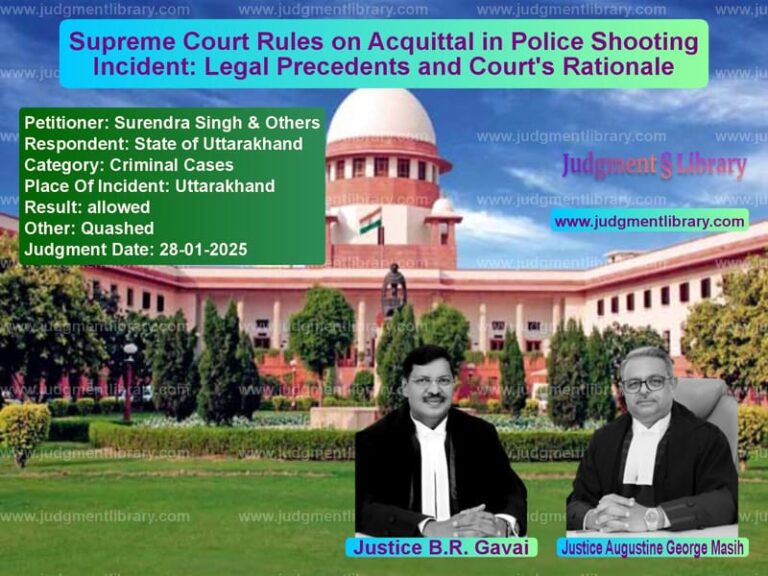Supreme Court Grants Bail in Fake Currency and UAPA Case: Right to Speedy Trial Upheld
The Supreme Court of India has granted bail to Sheikh Javed Iqbal @ Ashfaq Ansari @ Javed Ansari, who had been in custody for over nine years without trial. The case, which involved allegations of smuggling and circulation of counterfeit Indian currency and charges under the Unlawful Activities (Prevention) Act, 1967 (UAPA), highlights the constitutional right to a speedy trial and the principle that bail should not be withheld as punishment.
Background of the Case
The case stems from the arrest of the appellant, Sheikh Javed Iqbal, who was apprehended on February 22, 2015, at the Indo-Nepal border with counterfeit Indian currency worth Rs. 26,03,500. The police claimed that the appellant was part of an illegal network that smuggled and distributed fake currency. He was charged under Sections 489B and 489C of the Indian Penal Code (IPC) and Section 16 of the UAPA.
Despite being in custody since February 23, 2015, the trial proceeded at an extremely slow pace, with only two witnesses examined in nine years. The High Court had rejected his bail plea citing the seriousness of the charges and the risk of flight, given that the appellant is a Nepalese national.
Key Legal Issues Before the Supreme Court
- Whether prolonged incarceration without trial violated the fundamental right to a speedy trial.
- Whether the delay in trial justified granting bail under Article 21 of the Constitution.
- Whether the prosecution had provided valid grounds to continue denying bail.
Petitioner’s Arguments
The appellant’s counsel presented the following arguments in favor of bail:
- The appellant had been in custody for over nine years without significant progress in the trial.
- The prosecution had examined only two witnesses so far, with no indication of an expedited trial.
- The delay in trial violated the appellant’s fundamental right under Article 21 of the Constitution.
- The charges under UAPA were based on an invalid sanction, which the High Court had previously quashed.
Respondent’s Arguments
The State of Uttar Pradesh opposed the bail plea, citing:
- The gravity of the charges, including allegations of smuggling counterfeit currency.
- The appellant’s foreign nationality, making him a potential flight risk.
- The need to continue his detention to ensure trial completion.
Supreme Court’s Observations
The Supreme Court extensively examined the case and provided several key observations.
1. Right to Speedy Trial
The Court reiterated that prolonged detention without trial is unconstitutional. It cited previous rulings, including Hussainara Khatoon v. Home Secretary, State of Bihar (1980), emphasizing that unreasonable trial delays violate Article 21 of the Constitution.
2. Bail Cannot Be Withheld as Punishment
The Court quoted from Gudikanti Narasimhulu v. Public Prosecutor (1978), which held that bail should not be denied as a form of punishment but only to ensure the presence of the accused during the trial.
3. Procedural Delays and Their Impact
The Court criticized the lack of progress in the trial, noting that the case had remained stagnant for nine years. Despite multiple opportunities, the prosecution failed to demonstrate any urgency in concluding the case.
4. Foreign Nationality and Bail Conditions
The Court acknowledged the appellant’s foreign nationality but noted that stringent bail conditions could be imposed to mitigate flight risk.
Final Judgment
The Supreme Court ruled in favor of the appellant, stating:
- The continued incarceration of the appellant violated his right to a speedy trial.
- The prosecution had failed to justify the prolonged delay in trial proceedings.
- The appellant was granted bail with strict conditions to prevent absconding, including the surrender of his passport and regular reporting to the police.
Implications of the Judgment
This ruling reinforces the constitutional principles surrounding bail and the right to a fair trial. It serves as a reminder that prolonged pre-trial detention cannot be justified based solely on the gravity of charges, particularly when trials are delayed indefinitely.
The judgment also establishes that courts must balance national security concerns with individual rights, ensuring that undertrials are not subjected to endless detention without due process.
Petitioner Name: Sheikh Javed Iqbal @ Ashfaq Ansari @ Javed Ansari.Respondent Name: State of Uttar Pradesh.Judgment By: Justice J B Pardiwala, Justice Ujjal Bhuyan.Place Of Incident: Indo-Nepal Border, Uttar Pradesh.Judgment Date: 18-07-2024.
Don’t miss out on the full details! Download the complete judgment in PDF format below and gain valuable insights instantly!
Download Judgment: sheikh-javed-iqbal-@-vs-state-of-uttar-prade-supreme-court-of-india-judgment-dated-18-07-2024.pdf
Directly Download Judgment: Directly download this Judgment
See all petitions in Bail and Anticipatory Bail
See all petitions in Custodial Deaths and Police Misconduct
See all petitions in Terrorist Activities
See all petitions in Fraud and Forgery
See all petitions in Attempt to Murder Cases
See all petitions in Judgment by J.B. Pardiwala
See all petitions in Judgment by Ujjal Bhuyan
See all petitions in allowed
See all petitions in Quashed
See all petitions in supreme court of India judgments July 2024
See all petitions in 2024 judgments
See all posts in Criminal Cases Category
See all allowed petitions in Criminal Cases Category
See all Dismissed petitions in Criminal Cases Category
See all partially allowed petitions in Criminal Cases Category

